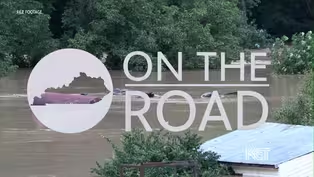
The Eastern Kentucky Economy
Clip: Season 2 Episode 18 | 3m 42sVideo has Closed Captions
Bill Estep sits down with Casey Parker-Bell to discuss the economy in Eastern Kentucky.
Bill Estep sits down with Casey Parker-Bell to discuss the coal industry and the economy in Eastern Kentucky.
Problems playing video? | Closed Captioning Feedback
Problems playing video? | Closed Captioning Feedback
Kentucky Edition is a local public television program presented by KET

The Eastern Kentucky Economy
Clip: Season 2 Episode 18 | 3m 42sVideo has Closed Captions
Bill Estep sits down with Casey Parker-Bell to discuss the coal industry and the economy in Eastern Kentucky.
Problems playing video? | Closed Captioning Feedback
How to Watch Kentucky Edition
Kentucky Edition is available to stream on pbs.org and the free PBS App, available on iPhone, Apple TV, Android TV, Android smartphones, Amazon Fire TV, Amazon Fire Tablet, Roku, Samsung Smart TV, and Vizio.
Providing Support for PBS.org
Learn Moreabout PBS online sponsorshipThis week, we're focusing on eastern Kentucky.
The next two days, Rene Shriver will be hosting Kentucky edition from Pikeville.
As we take a closer look at the beauty and challenges of the diverse region of the commonwealth.
But before we take off to eastern the eastern part of the state, we wanted to give you some background on the area and why we've decided to, as they say, take the show on the road.
So I spoke to Bill East Stepp, southern and eastern Kentucky, reporter for the Lexington Herald-Leader, who has a long history covering the region.
Throughout the history of coal, there's been ups and downs, but it's been on a on a downturn.
The peak employment in Kentucky coal was in the late eighties, early nineties.
It's gone down substantially since the last big downturn started in 2012.
So in the third quarter of 2011, you know, in the fall of 2011, in eastern Kentucky, there were 14,000 coal jobs.
Earlier this year there were 3800.
The area once known for its production of coal, is reshaping its economy.
The downturn in coal has led to declining population numbers.
And the Appalachian Regional Commission says that of the 54 counties it considers to be part of Appalachia, 51 are economically distressed or at risk.
Nobody expects that coal in eastern Kentucky are really anywhere in the country is going to come back to the level that it was even 20 years ago.
So those jobs are not coming back.
What do locals say that they need to help the area?
Well, one key thing that I think a lot of people would say they need in local officials is sustained investment in the region.
There are a lot of folks who feel like, you know, the coal industry helped build this country and what's left.
And but now there's no jobs left.
There's environmental problems left as a result of the of the coal industry.
So what the region needs to go forward now is a sustained investment from federal or state sources to help develop a new economy there.
He says part of the pathway is by local communities working together and that many counties have already started.
In some cases, two or three counties share a jail, for instance, or an animal shelter.
And so I think you'll see more of that regional regionalization as you go forward so that counties can afford to have those services.
As economies look to make this transition.
What are some of the advantages that Eastern Kentucky has?
People are always a primary advantage in eastern Kentucky.
The folks in Eastern have shown they can take a punch and come back.
I mean, you've had, you know, the economic problems that flood from last year and some people have had to move out to find work.
There's no question about that.
But a lot of other people have done have done what they had to do to stay home.
So that commitment to the region and that resilience, I think, is a is a is a strong advantage for the region.
People are committed.
They want to stay and they want to make it work.
And there's other events mean the beauty of the region.
I mean, I would argue it's as beautiful as anywhere in the country and there are efforts being made to capitalize on that in terms of tourism, especially outdoor tourism.
The shift from production jobs to a knowledge based economy has caught the region off guard.
In the US, more than 33% of people have at least a bachelor's degree.
And our study shows that in eastern Kentucky, that number is 16%.
Even with the challenges for the region, he says it has potential.
A real entrepreneurial spirit.
There's a lot of small business people trying things, and I think that willingness to try different things and take a chance is it's a real positive thing for the area.
And it's working out for some folks.
From the Holocaust to the Hollers
Video has Closed Captions
Clip: S2 Ep18 | 7m 41s | Renee Shaw sits down with Eastern Kentucky Luminary John Rosenberg. (7m 41s)
Video has Closed Captions
Clip: S2 Ep18 | 3m 55s | The challenge of making sure new homes in Eastern Kentucky are safe from future flooding. (3m 55s)
Providing Support for PBS.org
Learn Moreabout PBS online sponsorship
- News and Public Affairs

Top journalists deliver compelling original analysis of the hour's headlines.

- News and Public Affairs

FRONTLINE is investigative journalism that questions, explains and changes our world.












Support for PBS provided by:
Kentucky Edition is a local public television program presented by KET

